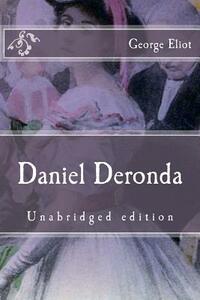Take a photo of a barcode or cover
One of the best class reads, especially when you have to read it in a week, get the flu, and get credit for writing a medicine-induced musical about it.
My review from 2005:
I'm a big Victorian-lit fan, and Eliot's Middlemarch is one of my all-time favorites, so I'm not sure why I hadn't read more of her stuff until now. But Deronda convinced me I will have to seek out and read the entire remainder of her back catalog of fiction. Her fiction is, to string together a bunch of adjectives and adverbs, sweepingly romantic, refreshingly practical, thoughtfully deep, and utterly compelling. Like Henry James, she dives deep into characters' psychology, and with fascinating results; but unlike James, she keeps a clear eye on the plot while she does so. Like Thomas Hardy, she introduces delicious scandal and forbidden romance; but unlike Hardy, she doesn't feel the need to destroy all innocent characters by the end of the book. Like Jane Austen, she plays on societal manners and customs, and the silly restrictions resulting therefrom; but unlike Austen, she lets things get mortally serious sometimes.
What's the story about? A confused and almost saintly young man, the title character, who has a weak spot for helping women in distress. This trait draws him into complications with both the naive and spoiled Gwendolyn, who gambles on a prestigious marriage and loses big time; and the Jewish waif Mirah, whom he meets by saving her from drowning herself in the Thames. But to say it's basically a love triangle would be a severe understatement, and anyway somewhat inaccurate. This is not your average predictable romance plot. Our Eliot is better than all that.
Ms. Eliot's writing puts me in a happy place. She makes sense to me, despite the centuries and miles separating us. And she also writes simply crackin' good fiction, as in this book, which may be one of the only Victorian novels to deal prominently and favorably with Judaism in London at the time. And as any good Victorian novel should be, it's also rich in its treatment of psychology, love, society, and family relations. And when you're done you can watch the awesome BBC miniseries version. What more do you need?
I'm a big Victorian-lit fan, and Eliot's Middlemarch is one of my all-time favorites, so I'm not sure why I hadn't read more of her stuff until now. But Deronda convinced me I will have to seek out and read the entire remainder of her back catalog of fiction. Her fiction is, to string together a bunch of adjectives and adverbs, sweepingly romantic, refreshingly practical, thoughtfully deep, and utterly compelling. Like Henry James, she dives deep into characters' psychology, and with fascinating results; but unlike James, she keeps a clear eye on the plot while she does so. Like Thomas Hardy, she introduces delicious scandal and forbidden romance; but unlike Hardy, she doesn't feel the need to destroy all innocent characters by the end of the book. Like Jane Austen, she plays on societal manners and customs, and the silly restrictions resulting therefrom; but unlike Austen, she lets things get mortally serious sometimes.
What's the story about? A confused and almost saintly young man, the title character, who has a weak spot for helping women in distress. This trait draws him into complications with both the naive and spoiled Gwendolyn, who gambles on a prestigious marriage and loses big time; and the Jewish waif Mirah, whom he meets by saving her from drowning herself in the Thames. But to say it's basically a love triangle would be a severe understatement, and anyway somewhat inaccurate. This is not your average predictable romance plot. Our Eliot is better than all that.
Ms. Eliot's writing puts me in a happy place. She makes sense to me, despite the centuries and miles separating us. And she also writes simply crackin' good fiction, as in this book, which may be one of the only Victorian novels to deal prominently and favorably with Judaism in London at the time. And as any good Victorian novel should be, it's also rich in its treatment of psychology, love, society, and family relations. And when you're done you can watch the awesome BBC miniseries version. What more do you need?
Dear Daniel Deronda, I love you. I know you are played by a ridiculously sweet-faced Hugh Dancy in the TV series. THAT IS ONLY PART OF IT. Daniel Deronda, you are so virtuous! You just want the best for everyone. You always do the right thing and you always help. You are even nice to Gwendolen even though she is a pill. You are the best (and cutest) Jiminy Cricket ever! Too bad about Hans, Laura
emotional
reflective
slow-paced
Plot or Character Driven:
Character
Strong character development:
Yes
Loveable characters:
Yes
Diverse cast of characters:
No
Flaws of characters a main focus:
Yes
challenging
emotional
hopeful
informative
reflective
medium-paced
Plot or Character Driven:
A mix
Strong character development:
Yes
Loveable characters:
Yes
Diverse cast of characters:
Yes
Flaws of characters a main focus:
Complicated
slow-paced
Plot or Character Driven:
Character
Strong character development:
Complicated
Loveable characters:
Complicated
Diverse cast of characters:
Yes
I actually had to read this book as a part of my English Literature class at university, among eight or nine other books. I had to read them all in less than three months so you can understand that I was not very pleased to start reading it (considering it's a very heavy book). And I carried that feeling with me as I began reading. I just wanted to get it over with as soon as possible and the slow pace of the book did me no good. I took me until about 2/3 into the book to actually start liking it. I felt like the first 400 or so pages were all meant to build up the story, in other words, it was too long to grasp my attention. But after those pages were behind me, I could clearly see how the author had needed that introduction in order for the book to work. I'm not going to talk about the plot or even the characters here. All I'm going to say is that the book was worth it in the end. I rated it three stars because, in my opinion, the setting of the story took a bit too long and throughout the book, the whole Jewish thing didn't add to the strength of the story. But I have to say that the main character, Gwendolen, was a very enjoyable character. There was some very nice character development there.
I hemmed and hawed between four and five stars on this one, in large part because it is SO LONG, but Eliot deserves the full admiral. Her language is just so delicious. I love her quirks, too, like writing her own epigraphs and throwing German, French, Italian and Latin into the text indiscriminately and without translation. Austenite though I am, I have to admit that Gwendolen Harleth has layers of complexity that one is not likely to find in an Austen heroine, partly because she is not exactly a heroine. As a deeply flawed character, we care about her in a way that Austen's ladies are frequently too perfect to permit, though I would argue that Anne Elliot from Persuasion would be an exception. Having conquered DD, I'm actually excited to finally read Middlemarch at some point (I know, blasphemy - I'll get to it, I swear!).
it was very very long and i did not have time to finish but it was a really good story






